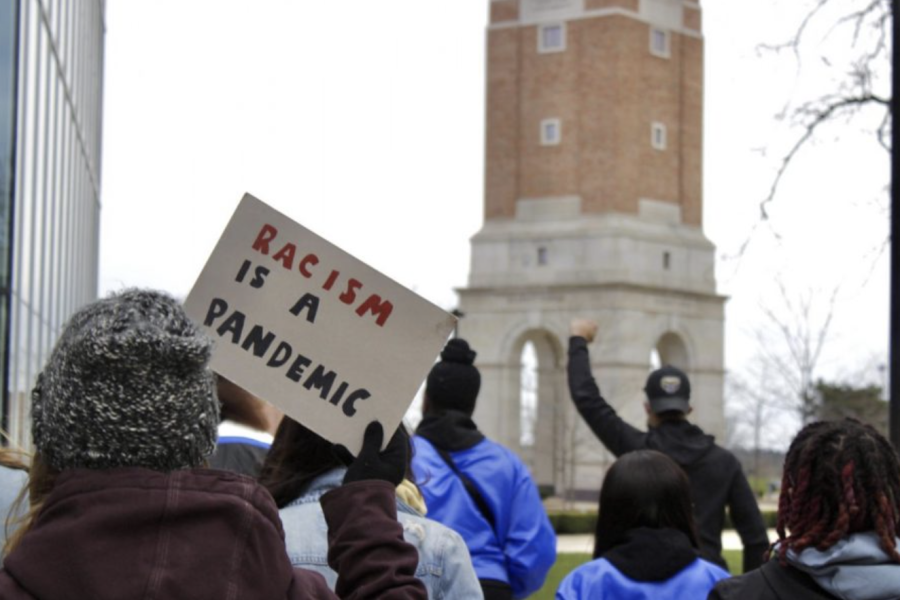SEHS introduces Initiative for Eradicating Racism
OU students at a Black Lives Matter demonstration in April 2021.
The School of Education and Human Services (SEHS) has begun to house a new initiative on campus aimed at tackling racism from an educational and community standpoint — The Initiative for Eradicating Racism (IER).
The roots of the initiative began to form in February 2020 as conversations surrounding antiracist scholarship and actions were discussed between Robert Martin, Ph.D., special lecturer in SEHS, Danielle Ligocki, Ph.D., assistant professor in SEHS and Chaunda Scott, Ph.D., professor in the Department of Organizational Leadership within SEHS.
After the murder of George Floyd in May of 2020 and the sparking of nationwide protests in support of the Black Lives Matter movement, the iniative became official and began their work to raise awareness regarding racism and its overdue eradication.
Scott, Martin and Ligocki began with a micro to macro picture in mind. The three started off within SEHS, working with colleagues across the school. They have additionally partnered with outside organizations to provide an educative stance within the community on racism and racial injustice.
Their vision statement notes the founders in SEHS recognizes the role that needs to be played in dismantling racism and states their responsibility to educate the campus and community, ultimately beginning racial healing in the community.
Since the founding of IER, the initiative has been involved with various events and speaking engagements such as panel discussions with the Center for Civic Engagement and educational videos made with the Galileo Institute for Teacher Leadership. Their biggest event so far was the fall symposium, held in September 2021, focused on dismantling racism in higher education, featuring keynote speaker Bettina Love, Ph.D.
While the ideas behind the Initiative for Eradicating Racism will remain the same, the founders aim to create the Center for Eradicating Racism in the near future to serve as a hub for research, teaching and service both on campus and within the community.
Martin, Scott and Ligocki reflect on the impact of such an initiative both from a professional and personal perspective. For Ligocki, she observed first-hand during her teaching career the mistreatment of marginalized students. She entered higher education with the goal of helping to create a future generation of teachers who would not behave in that way.
Martin states that, for him, this initiative and dedication to condemning racism allows for representation in a major way.
“This initiative means the world to me personally and emotionally because I have spent most of my life being in and out of predominantly white circumstances and feeling like I needed to represent and to be the lone voice,” Martin said. “I accept that and realize that there’s some good that can come from that, but it is extremely exhausting. It is so encouraging to me that an interdisciplinary team of brilliant people can come together and dedicate themselves professionally and personally to this problem, this original sin in our nation that needs to be taken care of. It is a professional responsibility but it is much more an emotional and personal commitment for me.”
Scott notes the formation of this initiative means proudly and confidently taking a stand to eradicate racism and sharing that message as broadly as possible. She states that while the responsibility falls on everyone, the initiative is here to get the conversation started.
The IER Antiracism Statement, signed by the founders, reads:
We, the faculty and staff members leading and supporting the Initiative for Eradicating Racism (IER) housed in the School of Education and Human Services at Oakland University in Rochester, Michigan unequivocally condemn all forms of racism. We condemn the recent killings of George Floyd, Breonna Taylor, Philando Castile and Ahmaud Arbery along with the numerous killings of Black people over the past decades who have been slain or harmed unjustly by law enforcement officers and white supremacist vigilantes. We as well condemn the recent racial incidents against Black students in area public schools in the United States and the racial discrimination presently against Black students and individuals in Ukraine who are being denied access to transportation to flee from Russia’s war on Ukraine.
Moreover, we proudly, passionately and confidently utilize the IER as our platform to speak up and out about systemic racism and white supremacy in our classes, scholarship and programming, and we stand in solidarity with the many protestors, scholars, students and individuals worldwide who condemn racism and support the #BlackLivesMatter movement mission and vision.
Furthermore, we remain dedicated to our commitments as antiracist educators who are leading and supporting an academic antiracsit initiative. We also accept that we must engage in antiracism work with humility and develop action-oriented efforts in order to make strides against eradicating racism. Therefore, we extend an invitation to our administrators, faculty, staff, students, community partners and community members to support us in this critical endeavor.
Martin encourages those who want to have further conversations regarding racism and IER, even if they are uncomfortable or feel clueless, to reach out. Scott also invites those interested in joining the initiative and ready to engage in the efforts to contact IER.








Clyde Benke • Mar 28, 2022 at 3:01 AM
You mean eradicate reality… you Orwellian tools.
Thornhill Williams • Mar 23, 2022 at 8:59 PM
Amazing work, thank you for keeping hope alive!
Thornhill
angelo jones • Mar 23, 2022 at 6:25 PM
Dr. Martin, I applaud this commitment and sincerely hope it will foster change in Oakland University. Hopefully, you get the support of every faulty member supporting this initiative.
Thanks,
Angelo